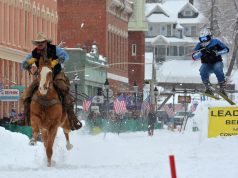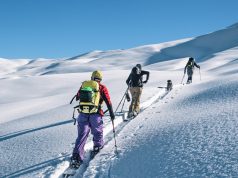
Jordan Campbell’s journey to South Sudan, and the film documenting the volunteer work of eye doctors from the U.S. there, started far across the globe in Tibet.
“I think there just comes a point in anybody’s life where you start taking a hard look at things and thinking, ‘What’s the best use of my life?’” Campbell says. He and photographer Ace Kvale, both Marmot Ambassador Athletes, started discussing that at a base camp in Tibet in a community so remote that many of the people there had never seen Americans before. They’d driven days by Jeep to get there and climb a previously unclimbed peak.
“I remember thinking, we were spending so much time at base camp looking at the locals and seeing there’s so much more we can do than just be mountaineers,” Campbell recounts. “When you start taking a look at that — maybe doing an eye camp with [Geoff] Tabin or with [Alan and Julie Crandall], this is a great use of my time, and my time off.”
Dr. Geoff Tabin is an ophthalmologist with the Himalayan Cataract Project and the Moray Eye Center in Utah. He’d done eye clinics in the Himalaya, where Campbell and Kvale were first exposed to his work. But Tabin wanted to take the project — a concentration of eye doctors working together to treat some of the estimated 17 million people in the world whose blindness is curable — to Africa. Campbell, Kvale and the other doctors who came along on the journey retell their story in Duk County: Peace is in Sight in the New South Sudan, a short film directed by Campbell screening in Boulder’s Adventure Film Festival on Oct. 4.
“Being blind, you’re like a mouth with no hands,” Tabin says in an interview in the film.
In South Sudan, an estimated one in 50 people are totally blind, often with cataracts, lenses so clouded over they can’t tell light from dark, or traucoma, an infection in the eyelids that leads to the eyelashes scraping the front of the eye. With replaced, artificial lenses, these people are able to see — children can go to school, fathers and grandmothers can see their children and grandchildren for the first time.
In December 2011, after two attempts that were both turned back because of violence in the area, Tabin, Campbell and Kvale, as well as Dr. Alan Crandall and his wife Julie Crandall and other doctors from the John A. Moran Eye Center in Utah, finally flew in over the wide savannas of Africa into South Sudan, the world’s newest country, created in July 2011 after a popular vote and emerging from a 40-year civil war.
“I was actually working eight, 10 hours a day as a volunteer, screening people or putting eye drops in eyeballs and really just taking care of these people who really had never been to doctors, and holding their hand so they weren’t nervous or scared,” Campbell says. Temperatures soared above 100 degrees, mosquitoes and black flies swarmed around patients and doctors, and in the evening, fruit bats came to roost in the clinic’s rafters.
Campbell and Kvale and Boulder-based videographer and clinic volunteer Michelle Bar-Even found time to shoot still photos and video, just on the instinct there was a story there to tell.
Hired local militia guard the Duk Lost Boys Clinic during the 2011 medical mission. Violence would erupt in the area just days after the medical team departed. | Photo by Jordan Campbell
“When I got back to the United States, I looked at all the media assets that were in front of me, with Michelle’s footage, my footage, my stills and Ace’s stills, and I thought, there is definitely a story to tell here,” Campbell recounts. “So what’s kind of interesting about Duk County is it really wasn’t initially a film project at its genesis. It was a story I wanted to tell, and I had it in my mind that there might be a way to capture enough video to make a small film, but I had no guarantee. I had no idea what we were going to get into.”
What they got into was a medical clinic, the Duk Lost Boys Clinic, founded by John Dau, one of the 10,000 Lost Boys of Sudan — a group of children who fled on foot to escape to Ethiopia trying to avoid violence in Sudan that seemed targeted on children.
Duk County is also a chance to revisit some of those boys who were in refugee camps for a decade and are just now, finally, coming back home as part of this brand new country’s precarious independence.
“I thought it would be a great opportunity to report on the world’s newest country, and delivering eye care to the most remote, underserved country in the world, arguably, which has been suffering under civil war for 40 years and there’s no access to any doctors, so I thought this would be a terrific story to chronicle,” Campbell says. “The story is a story about global stewardship for sure. It’s a story about these cataract surgeons going into this remote and underserved part of the world, and treating this unnecessary form of blindness. And that is a story in and of itself, and we could have easily made a film about just going and doing that, and I think it would have been a really wonderful, feel-good story, but I felt after we returned home and learned of the intertribal violence that had erupted in Tibor only 10 days after we came back and 3,000 or more people were killed in this incident in Tibor, I felt a real moral imperative to tell the story, and that’s what really pushed me over the edge to say I really want to make a film. As a writer, I’d never really directed a film, but I felt like the main thing was to make it a timeless piece of journalism.”
He secured footage of the conflict from BBC, the Associated Press and Reuters and included that in the film. That footage is matched with film from Campbell’s team and still photographs he and Kvale took — moments of pause to look in the eyes of the people of South Sudan — and gracefully edited together by Michael Herbener.
The film is going on to screenings in New York City and at the United Nations film festival later in October, but that Duk County is screening at the Adventure Film Festival comes with a particular resonance to Campbell, who was friends with Jonny Copp, the founder and spirit advisor for the Adventure Film Festival.
“I remember having several conversations with Jonny years ago, just about the spirit of the festival, and it was really like, he envisioned a festival that was for every man, every person, everyone,” Campbell says. “He really celebrated adventure in every form that it took, and so … I think that was kind of the part of this festival vision. I think he wanted to celebrate environmentalism, conservation, and then global stewardship I think was a big part of it too, and adventure in the many forms it could take on. So this certainly is a film I think he would be very proud to see.”
Duk County screens in the 8-10:30 p.m. session on Friday, Oct. 4 at the Adventure Film Festival at the Boulder Theater, 2032 14th St., Boulder. The film is followed by a panel discussion with doctors from the team. More information is at www.adventurefilm.com.
Respond: [email protected]














